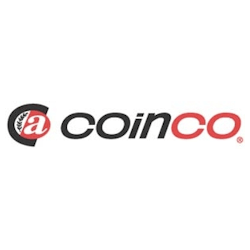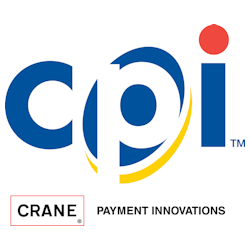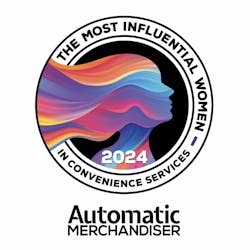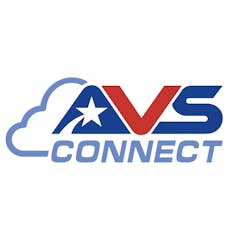As vend prices surpass a dollar, operators need to have confidence in the capability of their currency handling equipment. Bill validators facilitate the raising of prices, but other devices can further maximize customer convenience.
HIGHER PRICE POINTS
Bill validators are necessary in today’s vending bank, either on the machine or as part of a stand-alone change machine.
The benefit of bill validators is to capture incremental sales, said Tom Paczkowski, vice president of marketing, Coin Acceptors Inc. (CoinCo). The acceptance of paper currency allows operators to raise prices and meet the demand of populations who are carrying fewer coins with them. Additionally, with more items selling over a dollar and consumers carrying higher bills, operators are practically forced to turn on the $5 acceptance.
Higher denominations
lead to the problem of how to give change back to the customer. This can mean a larger demand
on the coin changer. A bill recycler might be more efficient since it can use the bills customers
are inserting into the machine as change for other customers, said
Paczkowski. Otherwise, the operator has to fill the coin dispenser more often.
VALIDATORS INCREASE SALES
When bill acceptors or bill validators were launched
around the 1980s, operators saw a spike in sales, maybe 25 percent back then, said Chuck
Reed, marketing director, MEI/Conlux. The argument is that by being able to accept higher
denomination bills, it’ll increase
the likelihood of not only a purchase, but the purchase of a higher
value product.
“Obviously everyone wants paper,” said Charlie Deck, president, Deck Vending Co., Conneaut, Ohio, about the popularity of bill validatiors. There’s definitely an increase in sales, he added. He is also increasing the number of validators which accept fives.
In machines with multiple dollar price points, Deck has seen an increase of at least 10 to 20 percent. Currently, these machines are set to present change in $1 coin mode, but Deck is looking at bill recyclers. “The American public wants to hold onto paper. Ones ($1 bills) don’t buy as much as they used to, so you have to accept $5 or $10s. If you have a bill recycler, you don’t have the added cost of a stand-alone changer,” said Deck.
Deck believes cashless technology and bill recyclers will each have a market in the future depending on the size of a location. Specifically, recyclers will be a good fit in a smaller location that still requires change for $5 and $10 bills. Currently, Deck has a few bill validators accepting $10 bills. He believes that number will grow.
Stansfield Vending Inc., La Crosse, Wis, reports that 80 percent of its machines accept bills $5 and higher. Some bill validators take $20s. “We are experimenting with recyclers, placing them in one machine at high volume accounts. They accept up to $20 bills and dispense $5,” said Jim Wilson, vice president. “Customers love them.” Although difficult to measure, Wilson believes the recyclers have increased his sales at those locations.
As the price of the products increases, said Wilson, fewer customers have the correct change in their pockets to make the purchase. This is a definite benefit to accepting bills in general.
RECYCLERS MINIMIZE CHANGER REFILLING
Paczkowski of Coin Acceptors makes a case for recyclers when a customer purchases an item with a $1.25 vend price. The consumer uses a $5 bill and now needs $3.75 in change. Instead of getting a pocket of coins, the customer can get three recycled bills and three quarters. He sees recyclers as something that can be empty at the start of the day, and then switch to returning deposited bills from cash paying consumers at a later time.
Coinco doesn’t offer recyclers, but Paczkowski sees
the pros and cons of the technology. Right now, he said the industry is in a discovery state,
evaluating the technology
of bill recyclers or, another option for increased price points, cashless readers.
DOLLAR COINS STILL GET MIXED REVIEWS
Many operators who are not using bill
recyclers report dispensing the dollar coin. Bob Yeomans, president of Central
Vending Co., Janesville, Wis., has bill validators on nearly all of his machines. And of
those, about 35 percent accept denominations as high as $5. “We only accept $5 bills
at machines that pay out dollar coins,” said Yeomans, “where we have a 4- or
5-tube coin mechanism on the machine.”
The Automatic Merchandiser State of the Vending Industry Survey has found that as many as half of all operators have switched from earlier coin changers to the 4- or 5- tube changers. Being able to make change with dollar coins has facilitated higher denomination bill acceptance.
Yeomans was one of the operators who took advantage of the larger capacity tube changers
as soon as they
were available.
INTEGRITY OF BILLS PRESENT AN ISSUE
Yeomans prefers coins to recycled bills because of problems with the integrity of the paper currency he’s received. The quality varies from the crisp new bills to the crumpled old bills. “The quality of bills is still a problem even with some of our bill validators,” said Yeomans. “We’re successfully using dollar coins,” Yeomans said, so he feels strongly about encouraging the new currency.
While some operators love the dollar coin, others have difficulty acquiring it. This affects the dollar coins’ desirability.
Reed from MEI said he estimates nearly every bill validator across the industry is set for dollar bills, whereas only 30 to 35 percent take $5. Less than 5 percent take $10 bills and less then 2 percent take $20 bills. If you take higher denominations such as $10 and $20 bills, you have to allow coin changers to dispense $1 coins when paying back change.
Customers aren’t thrilled with dollar coins, said Reed. Recyclers are one option, or operators can go to cashless. If someone is going to buy two or three sodas, swiping a credit card is more desirable. “Also, thinking of price points, cashless is a reasonable alternative for customers,” said Reed.
He claims a very small percentage of operators are using cashless. Of MEI equipment users, less than 5 percent are currently using cashless.
Reed attributes this to the telemetry and transaction fees. Operators are waiting for rates and vending tariffs to decrease, but they know it’s coming. Five years ago, there might have been a question of “if” the world is going cashless. But, Reed said, with Generation X using mostly credit, it’s less a matter of if, but when to add it to the vending bank.
Comparative analysis of different types of change making equipment for vending locations
| Equipment Type | Pros | Cons |
| Bill Recycler | Low draw on coin mechanism High customer satisfaction (paper change) Low service for refilling change tubes Acceptance of higher denomination bills |
Integrity of bills varies Cost of purchase of separate equipment Cost of maintenance/updates |
| Standard Coin Changer (quarters) | No additional equipment cost Customers more likely to reuse coin change for other vending purchases Immune to paper currency updates |
High refill rate for change quarter tubes Customers less satisfied with pocket of quarters High maintenance |
| 4- and 5-tube coin changer (dollar coins) | Customers prefer dollar coins to quarters Fewer service to refill changer Immune to paper currency updates |
Customers less satisfied with coins over bills Difficulty getting dollar coins in some areas |
COUPONS AND 'TAP AND GO'
In order for operators to meet every opportunity for a sale, Reed explained that MEI came out with the 4-in-one module. It’s a bill acceptor that also takes coupons, magnetic credit cards and the new “tap and go” credit cards or fobs. “The great thing is you can take a current bill validator and change what it accepts by changing the bezel (the facing on the equipment),” said Reed. “It gives operators even more options to offer customers. Specifically, they (the coupons) are inexpensive, robust and secure,” said Reed. They can’t be duplicated and are location or machine specific.
At Stansfield Vending, Wilson has not had a great deal of success with cashless, unless it is the only system available. In two county jail programs that use strictly debit cards, the system works very well, said Wilson. However, in a cafeteria where the debit cards were accepted with cash, the usage was marginal and was discontinued.
“Credit card transaction fees are a huge hurdle,” said Wilson. “I don’t see significant usage of credit cards in the next 10 years unless transaction fees decrease dramatically.” Wilson believes Stansfield Vending will go the route of bill recyclers as higher denomination bill acceptance is needed.
People are carrying fewer and fewer coins, said David Mays, president, Pyramid Technologies Inc., and using more bills. Recently, in the last five to 10 years, besides bills they are also carrying credit cards. But Mays doesn’t see cashless eliminating bill acceptors or even coin mechanisms.
“I see it as a transition thing. It makes no sense to eliminate bill acceptors in most locations, unless you’re worried about theft.” The bottom line is that having many options for payment means being less likely to lose a sale.
SECURITY OF BILL VALIDATORS
Bill validators are secure. There are a number of ways the manufacturers stop the acceptance of fraudulent bills, said Mays. Bill validators either use light shining through or bouncing off the bill. There’s also magnetic recognition (at least in U.S. currency) and different optical methods, including infrared and multicolor. The type of security depends on the manufacturer. “Bill acceptors for vending are usually simpler than say, those for gaming,” said Mays. Gaming validator security is more complex because acceptance of higher denominations necessitates fighting counterfeiters who focus on those bills.
MEI boasts unique algorithms which are unable to be faked by copiers, laser printers or digital encryption, according to Reed. Although security differs between their MEI and the less expensive Conlux model which uses a combo of optics and magnetics, Reed said they are both secure. “You don’t hear much fraud in vending due to the lower denomination,” said Reed. “Operators want to know it’s there, but there is not a lot of discussion about security.”
CHANGERS OR BILL VALIDATORS
In direct competition to on-machine bill validators is the stand-alone change machine, which is a large investment. Benefits to this are a higher volume of change available, meaning less fill ups as well as a single piece of equipment serving a number of machines. There’s no need to purchase multiple bill validators, since machines come with coin acceptors standard. Additionally, stand-alone changers prevent consumers from using the validators to make change. Thus, while the bill changer itself requires an investment (including the change fund), it can also minimize validator service calls.
Mike Coons, vice president, Standard
Changer-Makers Inc., said there’s recently been
interest in a new change
machine that recycles multiple currencies. The new BCX Series – Bill & Coin Exchangers,
said Coons, dispenses both paper bills and coins, and provides a combination of quarters
or dollar coins with $5 bills in exchange for $10 and $20 bills. It’s a great machine
for large vending locations, and has proven popular in hospitals and professional office
buildings.
“As for currency updates, there is a competitive advantage we have over the bill validators or recyclers,” said Coons. The operators using a change machine have to update a single machine/bill validator when they use a changer in a vending location.
$5 UPGRADE
The $5 bill upgrade has had the biggest impact on the vending industry compared to other currency changes because most machines that accept anything over a dollar accept the five.
How operators will update their Coin Acceptors’ equipment depends on the age and quantity of bill validators they have, said Paczkowski. Operators can purchase a handheld field programmer which has the new pattern. It hooks up to the validator to update it.
Depending on the different program levels associated with the handheld, the cost ranges from $100 to $150. If an operator has an older device or too few to warrant the purchase of the handheld, he or she can take the unit to a service center and they will load the new pattern. The update at a service center is free, but is part of a clean and calibration service with a fee, said Paczkowski.
MEI sells a bill programming module for less than $100 for updating bill validators. It handles unlimited updates and can be brought back for new software if new currency comes out, explained Reed.
Operators using Pyramid equipment are able to update their bill acceptors in two ways. Pyramid puts the software on its Website where operators can download it to their portable computers for free. They then need to purchase a special cable from Pyramid (about $35) to connect the computer to the validators. Otherwise, said Mays, Pyramid sells a PRO1 reusable device for around $130. The PRO1 connects to equipment in the field and will be compatible with future currency updates from Pyramid.
EQUIPMENT MANUFACTURERS ARE SUPPORTIVE
Operators report that manufacturers have been helpful in these updates, but it’s still a cost of doing business they don’t need. “You have to do it, but it isn’t bringing anymore money to the bottom line,” said Deck. Not doing it will lose you sales.
Wilson indicates the process to update his equipment for the new $5 is very labor intensive. “Generally, the end user is unaware of these types of expenditures,” he said.
The future of currency handing equipment certainly includes bill validators as the price of products increases beyond a dollar. Accepting the form of payment end users have in their wallets is essential to making sales. Returning change in a consumer friendly way is just as essential whether operators choose dollar coins or recycled bills. Cashless does away with returning change, but has extra financial considerations.
For more information, contact:
Coin Acceptors Inc.
800-325-COIN (2646), www.coinco.com
MEI/Conlux
800-345-8215, www.meigroup.com
Pyramid Technologies Inc.
480-507-0088, www.pyramidacceptors.com
Standard Changer-Makers Inc.
800-968-6955, www.standardchange.com






